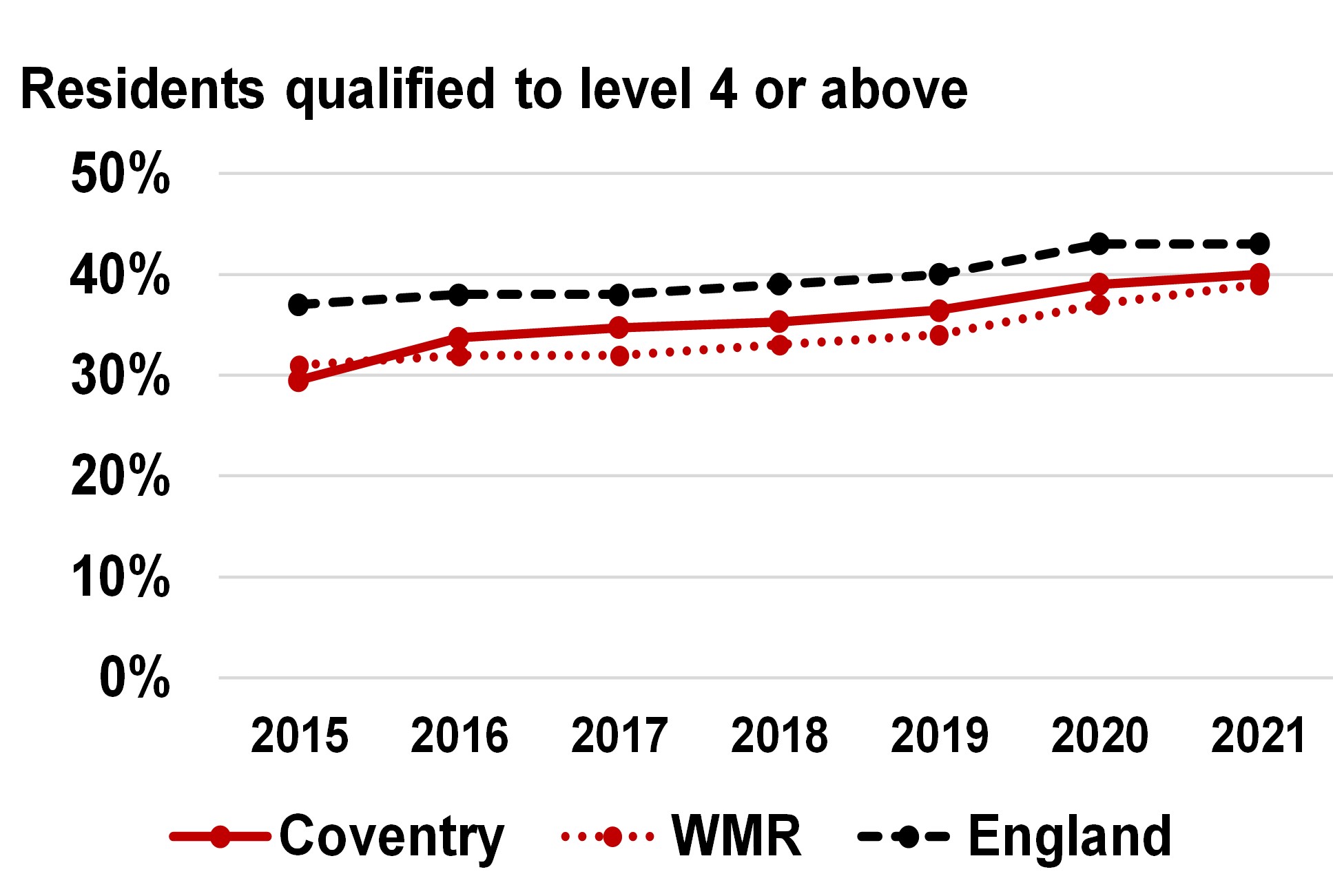Actively supporting residents to improve their skills and secure better jobs
Qualifications
The total number of Coventry residents who have qualifications up to higher education level or higher (NVQ level 4 is equivalent to a foundation degree) has continued to increase, reaching an estimated 101,100 in 2021. This amounts to an estimated 40% of all working age residents of Coventry.
More important than just the total number increasing, the proportion with higher level qualifications has been increasing as a trend and continued to increase in 2021, although a moderate annual increase compared to larger increases a few years ago. The total number of residents qualified at level 4 or above has doubled in 10 years and increased from 30% to 40% between 2015 and 2021.
The improving trend in residents being highly qualified is a positive influence on the local economy, for jobs and productivity, and the prosperity of Coventry people. It is, perhaps, both indicative of improving productivity of local businesses and residents increasing having higher paid jobs, as well as a factor that will support these trends in the future.
However, the data shows that Coventry’s improvement has not given the city a competitive advantage in a significant way; similar increasing trends are seen across England overall, across the West Midlands region and in other places like Coventry.
The University of Warwick and Coventry University, in particular their increasing size and success, are local assets that will support the skills and qualifications of Coventry residents.
In the past, research has shown that graduate retention in Coventry from these institutions has been modest compared to some other places; updated research into current levels of retention, how many graduates of the two universities stay to live and work in Coventry, and the factors behind this, may be useful.

At the other end of the spectrum, 7.6% of Coventry residents (19,100) have no qualifications; compared to 7.7% for West Midlands and 6.4% for England. 7.6% with no qualifications in Coventry is an increase from 7.1% in 2020.

Training for accredited qualifications
Through Skills 4 Growth, a European Social Funded programme, a total of 108 small and medium-sized enterprises have been supported leading to accredited training and qualifications for 363 employees meeting their identified skills needs.
Apprenticeship Levy
The Apprenticeship Levy, imposed on larger businesses including the Council, helps businesses support their employees’ professional development. This year the Council has continued to build on its success in supporting smaller, non-levy paying businesses with apprenticeship training costs.
We are continuing to prioritise Coventry businesses and residents, particularly apprentices from disadvantaged and under-represented backgrounds. The funds transferred for 2020/21 totalled £74,734 and this increased 31% to £97,976 for 2021/22. The total pledged as of the end of 2021/22 has reached £364,617, supporting 76 apprentices at 21 businesses in the city.
Supporting young people into work
The Coventry youth hub provides a fully integrated service for all young people who are aged 16-29 and claiming Universal Credit, enabling job shop advisors and jobcentre plus staff together to support Coventry’s young people to re-engage with training and the labour market. This year the Coventry youth hub has supported 1,559 young people, with 201 moving into work both part-time and full-time.
Job placements through Kickstart
The Department of Work and Pensions Kickstart Scheme ran from September 2020 to April 2022. There were delays in implementing the scheme, but the Job Shop got involved at the earliest possible opportunity to act as an official ‘Gateway’ organisation to support local businesses through the Kickstart application process.
Employers were supported to create six-month paid job placements for 16-24 years old on Universal Credit who are at risk of long-term unemployment, with the Job Shop providing additional ‘wraparound’ support to ensure the placements were successful. As a Gateway, the Job Shop supported 100 employers to create over 300 vacancies. 152 of these were secured by Job Shop customers with over 80% of these being retained by their employers after the six-month Kickstart period ended.
Destinations of school leavers 16+
These official statistics show the percentage of school pupils continuing to a “sustained education, apprenticeship or employment destination” after completing year 11. To be counted in a destination, young people must have “sustained participation” for a six-month period in the destination year. This includes attending for the first two terms of the academic year (October 2019 to March 2020) at one or more education providers; spending five of the six months in employment; or a combination of the two.
A sustained apprenticeship is recorded when six months’ continuous participation is recorded at any point in the destination year (between August 2019 and July 2020). The latest figure available is for 2019/20 with Coventry at 93% - which was 1% point below both national and West Midlands results.
Young people not in education, employment, or training
The number of young people aged 16 and 17 years old who were not in education, employment of training (or whose status in unknown) is another statistic that monitors the destinations of young people after secondary school, often shortened to ‘NEETs’. This data gives slightly more recent data, for 2021, and allows us to compare further back in time.
The data suggests 340 young people aged 16-17 in Coventry were not in education, employment, or training (NEET). This is around 4.4% of 16–17-year-olds in the city. This is an improvement on the last four years’ performance and an all-time low. Coventry’s rate remains below (better than) both the West Midlands regional rate and the England rate.


